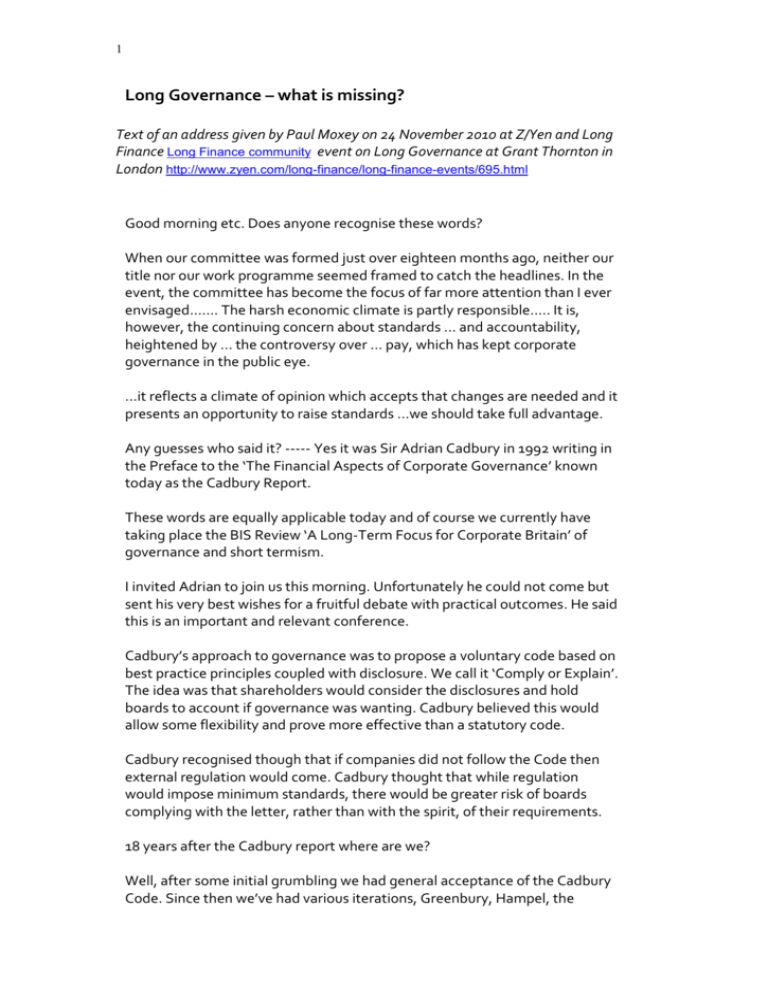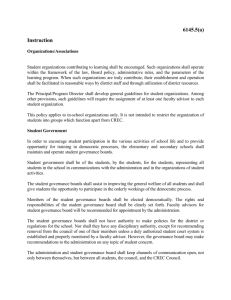presentation
advertisement

1 Long Governance – what is missing? Text of an address given by Paul Moxey on 24 November 2010 at Z/Yen and Long Finance Long Finance community event on Long Governance at Grant Thornton in London http://www.zyen.com/long-finance/long-finance-events/695.html Good morning etc. Does anyone recognise these words? When our committee was formed just over eighteen months ago, neither our title nor our work programme seemed framed to catch the headlines. In the event, the committee has become the focus of far more attention than I ever envisaged……. The harsh economic climate is partly responsible….. It is, however, the continuing concern about standards … and accountability, heightened by … the controversy over … pay, which has kept corporate governance in the public eye. …it reflects a climate of opinion which accepts that changes are needed and it presents an opportunity to raise standards …we should take full advantage. Any guesses who said it? ----- Yes it was Sir Adrian Cadbury in 1992 writing in the Preface to the ‘The Financial Aspects of Corporate Governance’ known today as the Cadbury Report. These words are equally applicable today and of course we currently have taking place the BIS Review ‘A Long-Term Focus for Corporate Britain’ of governance and short termism. I invited Adrian to join us this morning. Unfortunately he could not come but sent his very best wishes for a fruitful debate with practical outcomes. He said this is an important and relevant conference. Cadbury’s approach to governance was to propose a voluntary code based on best practice principles coupled with disclosure. We call it ‘Comply or Explain’. The idea was that shareholders would consider the disclosures and hold boards to account if governance was wanting. Cadbury believed this would allow some flexibility and prove more effective than a statutory code. Cadbury recognised though that if companies did not follow the Code then external regulation would come. Cadbury thought that while regulation would impose minimum standards, there would be greater risk of boards complying with the letter, rather than with the spirit, of their requirements. 18 years after the Cadbury report where are we? Well, after some initial grumbling we had general acceptance of the Cadbury Code. Since then we’ve had various iterations, Greenbury, Hampel, the 2 Combined Code and the Turnbull Guidance on internal control. Then along came Enron and WorldCom which gave rise to a lengthy and wide ranging Sarbanes Oxley Act. In the UK we were grateful that Enron did not happen here and prided ourselves that our system was better. On mainland Europe however there was Ahold and Parmalat so the European Commission took an active interest and still does. Numerous consultations took place and various Directives and Recommendations were issued on such matters as nonexecutive directors, audit committees, governance reporting against a code and directors’ pay. In general the rest of Europe adopted the UK Comply or Explain approach. And we have stuck to it. But we are still have the problem of people complying with the letter rather than the spirit of standards. Enron and WorldCom highlighted all sorts of failings. In the UK the DTI commissioned two reviews to see whether the UK needed to do anything. We had the Higgs Review of the effectiveness of non-executive directors and the Smith Report on Audit committees. These led to a longer version of the Combined Code. Since then we had another version of the Combined Code and revised Turnbull Guidance. After all these developments in governance, we hoped that we had it sorted. But then the financial crisis came along and a number of banks failed. They failed in the USA, the UK and on mainland Europe. There are marked differences in approach to corporate governance in each of the three areas but we had governance failures in all of them. It would be wrong to blame the financial crisis entirely on corporate governance but there were many significant failings. Bank boards said no one could have predicted what would happen. Politicians and regulators agreed. Institutional shareholders said they were not to blame. All the main players said they were not to blame. So, no one was to blame and no one could have foreseen events. Yet we had shareholders that did not hold boards to account and shareholders did not prevent bank failure or massive losses. Nor did non executive directors hold management to account. We saw what with hindsight seems like reckless risk taking. But is it worse than just non exec directors and shareholders simply not holding people to account? Vince Cable said that the CEO of a failed UK bank admitted to him that its lending was ‘foolish and dangerous’ but told him he would have been fired by the board if he had reined in on lending. I wonder if the non-executives thought the City expected them to continue expanding lending. So what happened? Was it that these institutions which failed or suffered billions in losses did not comply with best corporate governance practice? – No, they all complied with local best practice. Was it then that they did not have proper risk management systems? Well, at the time these banks were thought to have leading edge risk management. 3 The SEC and ratings agencies thought Lehman’s approach to risk and the way it used Value at Risk was particularly good. In January 2007, the external auditors of UBS made an in-depth examination of the UBS Group Risk Reporting Process. They reported that "the Group risk reporting processes were adequate to ensure that the key risks reported by the Business Groups were adequately included in the Group Risk Reporting”, and that "the Group Risk Reporting processes were not complex in their execution and were performed by experienced professionals." If had been an audit committee member I might have taken comfort from that. Just after the run on Northern Rock, I met the audit committee chair of one of the failed Irish Banks over a drink. I asked him if it was very difficult for an audit committee to get all the right information to be satisfied about risk management. Not a bit of it he said in all sincerity. We have very good people working for us who prepare good information. He had no concerns at all. Two years ago we issued a paper ‘Corporate Governance and the Credit Crunch’. We outlined a catalogue of corporate governance failings which made us a little unpopular with some people, but many praised it. This was at a time when people still said there were no problems with corporate governance. It is worth looking at, and there are a few copies here today. http://www.accaglobal.com/pubs/general/activities/library/governance/cg_pubs/cg_cc. pdf We identified that the root of the problem was not that anyone had not complied with governance requirements. They had, the problem is that governance practice was wrong. There was compliance with the form but not the substance of good governance. The problems were primarily with culture, human behaviour and incentives and motivation or if you like – greed and turning a blind eye. When the 2003 Combined Code was issued after Higgs and Smith, ACCA said ‘There are no provisions or principles here which focus on the broad framework of corporate responsibility. It appears to have ignored those who feel let down by business leaders and the investment community as the extent of corporate greed and negative social impact becomes clearer. Since then we have been calling for our governance code to focus more on culture, values and ethics. While companies only have to state their compliance with the Code provisions, they are required to state how they apply the Code main principles. We have repeatedly suggested that companies report how the board discharges its responsibility, currently in a supporting principle, for setting the values and standards of the organisation. 4 Sir David Walker rightly said in his review of governance in banks and related financial institutions that the governance failures were a behavioural issue. I agree but will his recommendations bring about the desired behaviour? We were glad to see that, following Walker, the new UK Code of Corporate Governance in the third paragraph says corporate governance is about what the board of a company does and how it sets the values of the company. Why then are the provisions and main principles silent on the subject of values? and why is the new Stewardship Code also silent on this? How do we get the right behaviour? Michel Barnier, the EC Commissioner responsible for the latest consultation on governance, said in a speech last month ‘I am clear we will not be able to rely only on voluntary codes’. Perhaps not, but can we rely any better on rules? Regulation has unintended consequences. What we have seen in the crisis time after time were people who do not so much ‘play-by-the-rules’ as ‘game-the-rules’. It is incentives that drive behaviour. We need to get smarter. The stock response to governance shortcomings is to add more governance requirements and try and make them more binding. In the UK we have the new UK Code and I think we are hoping that the new Stewardship Code will make it more binding. It could but I think its emphasis needs to change from how companies apply code provisions to how the principles are applied. This is what governance should be about and it is difficult to game principles if someone is shining a light on behaviour and people are watching. In a piece of research just published, David Erkensa and others looked at nearly 300 financial firms across 30 countries. They found that firms with more independent boards and higher institutional ownership had worse stock returns during the crisis period. They said firms with higher institutional ownership took more risk prior to the crisis, which resulted in larger shareholder losses during the crisis. They said their findings cast doubt on whether regulatory changes to increase shareholder activism and monitoring by outside directors will be effective. Perhaps we should return to Cadbury, the report is very relevant to today’s challenges. The Cadbury Report said the principles on which the Code is based are those of openness, integrity and accountability. They go together. Openness on the part of companies is the basis for the confidence which needs to exist between business and all those who have a stake in its success. An open approach to the disclosure of information contributes to the efficient working of the market economy, prompts boards to take effective action and allows shareholders and others to scrutinise companies more thoroughly. Cadbury said integrity means both straight forward dealing and completeness. 5 He said boards of directors are accountable to their shareholders and both have to play their part in making that accountability effective. Boards of directors need to do so through the quality of the information they provide to shareholders, and shareholders through exercising their responsibilities as owners. Surely the job of anyone interested in good governance is to work out how to have real openness, integrity and accountability over what really matters – about performance, values and principle rather than compliance.







